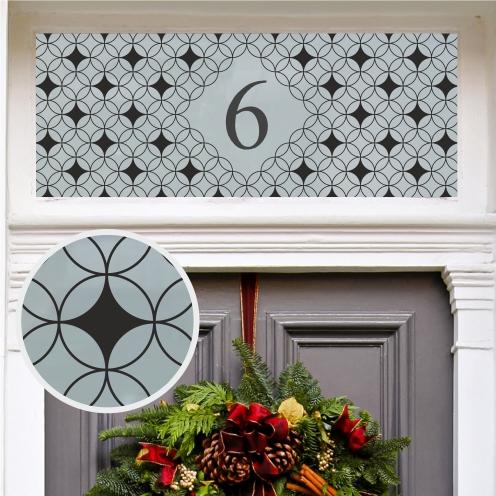Corvus House Number
Order your own contemporary patterned house number sticker to your exact measurements, and in a choice of fonts and colours. This design has a frosted background with a transparent or coloured text and pattern.
You can also order additional panels with the same pattern but with no number by clicking here.
Read MoreMeasurement Convertor
Product Description
Please use this online facility to order your period house number to your exact measurements, with your own number, and in a choice of fonts and colours.
You can also order additional panels with the same Corvus pattern but with no number by clicking here.
HOW TO ORDER
- Enter the size of your pane
- Enter your house number
- Choose a font and font size (height in centimetres)
- Select a colour for the text and pattern (transparent option available)
Your design will be shown in the preview box. Make the necessary amendments until you are satisfied with your design.
MEASUREMENTS
To order please enter the measurements of the pane you wish to cover in CENTIMETRES. If you want to leave a clear gap around the film, just deduct the size of the required gap twice from the width and height of the window (eg if your window is 30cm x 40cm and you require a 1cm gap all round then order the film at 28cm x 38cm).
ASPECT
Window film is applied internally on glass, so your design will be printed in reverse to be read correctly from the outside. If you have to apply the film externally, please let us know in the extra requirements field and we'll make sure your design is not printed in reverse.
COLOUR OPTIONS
We print coloured number and pattern directly on stock etch effect film (apart from black which we print on clear film within a printed etch effect background).
For transparent text option, we print an etch effect background on a clear film, leaving the number and pattern see through.
TEXT
Just enter your house number in the text box and it will show in the preview. Select a font of your choice and play around with the size (in centimetres) until you are satisfied with your design.
INSTALLATION
The finished product is easy to apply using soapy water and a felt edge squeegee provided with your order.
We also supply other handy installation tools.
Please refer to our video tutorial for installation tips.
Back to top
How To Apply
Step by step instructions on how to apply window film & frost glass
Regardless of the type of window film or stickers you purchase, whether frosted, tinted, mirror or decorative, the principle on how to fit window film will be the same. We also have several targeted video tutorials which you will find by clicking here.
Glass Preparation (the crucial task)
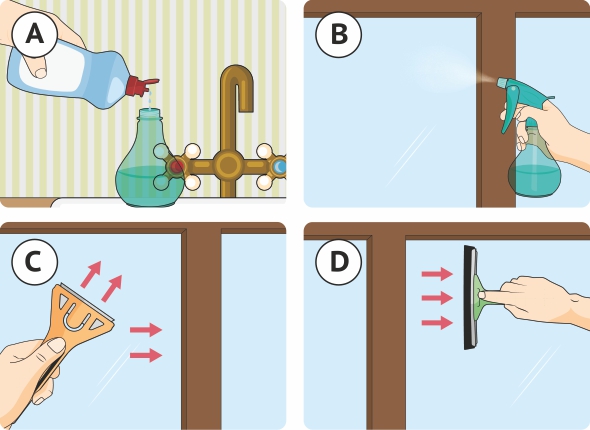
Make a slip solution using a few drops of washing up liquid mixed with water in a spray bottle and thoroughly clean the glass. Use a glass scraper to remove specks of paint, or any other glass covering like stickers.
Film Cutting
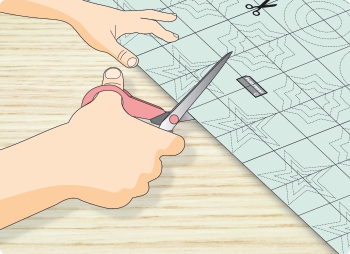
Unless your window film is already cut to size, and if the film has a paper liner with a metric grid, measure your glass at the top and bottom, and left and right and mark and cut your window film. You can also cut the film bigger than required and trim it once applied to the glass.
Film Application
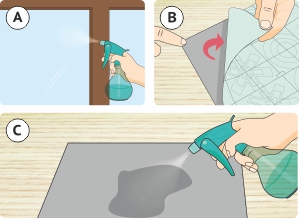
A. Thoroughly wet the glass with the slip solution.
B. Place the window film face down an a flat surface and expose a small amount of the adhesive or cling side.
C. Spray the adhesive or cling side liberally with the slip solution as you peel off the protective liner.
D. Slip the adhesive or cling side of the film on the glass butting one edge and the top against the window frame or rubber gasket (double glazed unit).
Squeegee Technique
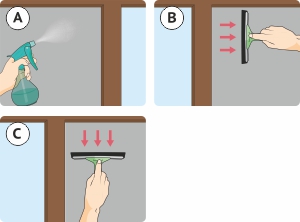
A. Liberally wet the face of the film with the solution to act as a lubricant fro your squeegee or felt edged tool.
B-C. Squeeze out the solution from under the film using a firm and even pressure, starting from the top and working your way down and across the film.
Film Trimming
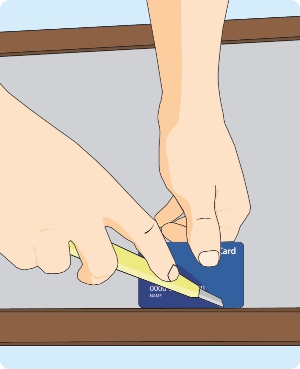
Run a credit card and a retractable knife blade down the edge of the glass to trim any excess film. The thickness of the card will allow for a small gap to help any remaining solution to be squeezed out. Once trimming is complete go over the film once more to squeeze out all the solution.
Final Checks
1. Make sure that all the solution has been squeezed out.
2. Wipe the film and any remaining solution with paper towel.
3. Inspect the film on both sides of the glass to check for any trapped solution or air bubbles.
How To Remove Window Film
Removing window film can be a very easy process, but it all depends on how long the film has been on the glass, and the type of film that was used.
Here's a video tutorial which shows the basic principal.
Typically, films are either made using PVC or PET.
PVC is a soft material which can be peeled off the glass with a glass scraper. Any glue residue can be removed with soapy water and a scraper.
PET is a brittle material widely used for solar and safety film, and might be made of layers of mettalised material. To remove this type of film, use a wide glass scraper and lubricate with soapy water to remove the film.
As a rule, old PET film are more difficult to remove than PVC films.
For large panes, it is best to first score the film into strips with a sharp knife. This means that you can tackle it in more manageable pieces.
Measuring Tips
Ready to place your window film order?
You will first need to measure the glass, in centimetres, using a tape measure. Only measure the glass you want to cover.
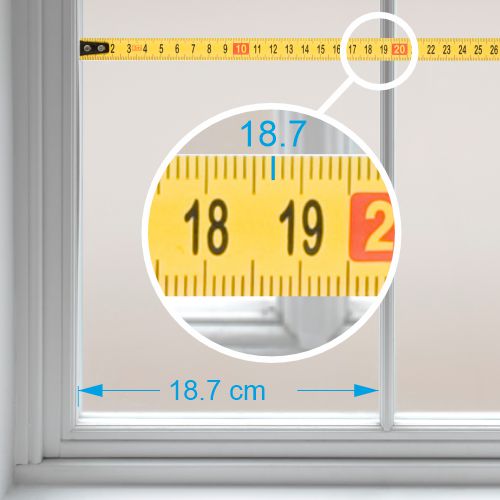
Width: measure from left to right at the top and the bottom of the glass, and take note of the largest measurements (some older wooden windows are not perfectly square).
Height: measure from top to bottom on the left and the right of the glass, and take note of the largest measurements.
Top tip
Leaving a clear gap around frosted or patterned film is a stylish and practical option, allowing you to peep out when someone is at the door for example. To create a clear outline around the film, deduct twice the width of the desired clear outline, to the width and the height of your pane.
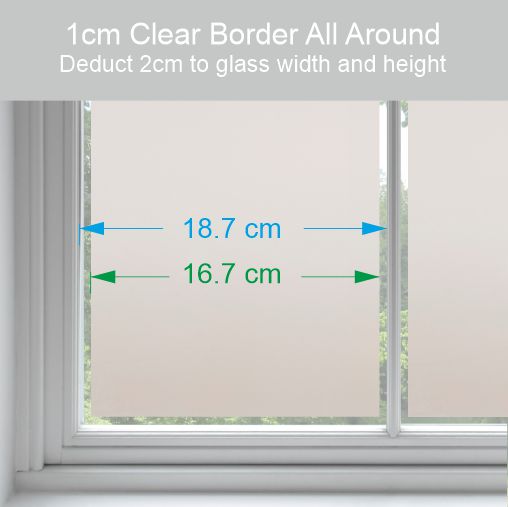
For example, if you want a 1cm (10mm) clear gap all the way round, deduct 2cm from the width, and the same from the height.
Fitting the film with a gap all the way round is much easier, especially on old wooden windows and doors which are not always in the best condition, and where the edge of the glass has paint encroachment.
Care
How To Care For Your window film After Installation
Window film is very easy to look after and you won't need any special products to clean it with. In fact, soapy water, similar to the solution you used to apply the film is the best cleaning product.
Do's
Wait for at least 3 weeks before first cleaning your film
Use soapy water
Use a soft cloth or paper towel
Use a rubber edged squeegee (unless the film is printed or has cut outs) in good condition
Don'ts
Do not use abrasive products
Do not use Amonia based products
Do not use defective or damaged squeegees
Caring for printed films, or films with cut-outs
Extra care must be taken when cleaning printed films, or films which have been cut out and have exposed edges. Gently clean with a soft cloth only, and take particular care around the cut areas. Do not rub too hard or use a squeegee as it could damage the print or your cut film.
Caring for static cling films & stickers
Take extra care around the edges and clean your sticker or film from the centre out. Do not use a squeegee.


